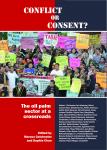
The rights of Baka communities in the REDD+ Ngoyla-Mintom project in Cameroon
21 Mar 2016
Of the indigenous hunter gatherer peoples of Cameroon (the peoples who self-identify as ‘autochthonous’), the Baka are the largest group, numbering about 40,000 and living in an area of 75,000 km2 in the south-west of the country; the Bagyeli/Bokola are the second-largest group with approximately 3,700 people living near the coast in an area of about 12,000 km2; and the third-largest group are the Bedzang who live in the forests north-west of Mbam (Ngambe-Tikar), in the Central Region.





